Point "Heart" Break, or: Why Bodhi and Johnny Utah Just Want to Bang Each Other
By Anthony Manzi, February 12, 2014
![]() The action film is defined by masculinity. It’s a genre where hard muscles and big guns are the engine, and testosterone is the fuel. The genre has succeeded for decades with male audiences by staying true to a simple formula: men behaving manly in the face of lesser men in order to validate their own superior manliness. The heroes of the action film are the definition of the heterosexual man. They’re fearless, taciturn, stoic, virile, and above all, deeply faithful to the masculine construct. The entire structure of the genre was built around this androcentric ideology. It’s a genre created by men, for men, in celebration of men. Classic action films don’t just reaffirm this ideology, they force it down the viewer’s gaze, indoctrinating the values that heterosexual men are supposed to hold sacred. And yet, after seeing enough action films, an unintentional pattern begins to emerge, a pattern that is buried deep beneath the masculinity. It’s a phenomenon that’s inherent to the genre, yet antithetical to the genre’s ideals. No matter how much the action film adheres to its established structure, the pattern is always present, tapping faintly in the distance like a persistent drip, waiting to be discovered. In 1991, a single pioneering action film was made that not only exposed the pattern, but pulled back the genre’s curtain completely, revealing just how gay the action film really is.
The action film is defined by masculinity. It’s a genre where hard muscles and big guns are the engine, and testosterone is the fuel. The genre has succeeded for decades with male audiences by staying true to a simple formula: men behaving manly in the face of lesser men in order to validate their own superior manliness. The heroes of the action film are the definition of the heterosexual man. They’re fearless, taciturn, stoic, virile, and above all, deeply faithful to the masculine construct. The entire structure of the genre was built around this androcentric ideology. It’s a genre created by men, for men, in celebration of men. Classic action films don’t just reaffirm this ideology, they force it down the viewer’s gaze, indoctrinating the values that heterosexual men are supposed to hold sacred. And yet, after seeing enough action films, an unintentional pattern begins to emerge, a pattern that is buried deep beneath the masculinity. It’s a phenomenon that’s inherent to the genre, yet antithetical to the genre’s ideals. No matter how much the action film adheres to its established structure, the pattern is always present, tapping faintly in the distance like a persistent drip, waiting to be discovered. In 1991, a single pioneering action film was made that not only exposed the pattern, but pulled back the genre’s curtain completely, revealing just how gay the action film really is.
In 1991, Kathryn Bigelow directed Point Break. The film was a box office success, it was praised by critics for its stylistic action sequences, and it made stars Keanu Reeves and Patrick Swayze into even bigger stars than they already were. Since the film’s release, it’s achieved a fan base large enough to exalt it into the pantheon of the action classic. (At the July 6th, 2013 Summer Movie Series presentation of the film at Red Rocks amphitheater in Morrison, Colorado, over 7,000 tickets were sold.) There has been a live theater version of the film called Point Break Live!, a 2000 remake that doesn’t admit to being a remake but clearly is (The Fast and the Furious), and now an "official" remake is in the works for 2014. Suffice is to say, the legend of Point Break has grown exponentially since its 1991 release, begging the question: What makes it so special?
 Point Break can be evenly divided into three layers. On the surface floats a standard action narrative that follows undercover FBI agent Johnny Utah (Keanu Reeves) into the radical world of surfing, skydiving, and bank robbing. Agent Utah has been tasked with finding and infiltrating a group of masked criminals called the "ex-presidents," who are believed to be surfers that rob banks in order to finance their carefree lifestyles. The group is led by Bodhi (Patrick Swayze), a deeply spiritual thrill seeker who seduces agent Utah into joining him in his pursuit of "the ultimate rush."
Point Break can be evenly divided into three layers. On the surface floats a standard action narrative that follows undercover FBI agent Johnny Utah (Keanu Reeves) into the radical world of surfing, skydiving, and bank robbing. Agent Utah has been tasked with finding and infiltrating a group of masked criminals called the "ex-presidents," who are believed to be surfers that rob banks in order to finance their carefree lifestyles. The group is led by Bodhi (Patrick Swayze), a deeply spiritual thrill seeker who seduces agent Utah into joining him in his pursuit of "the ultimate rush."
Beneath the surface layer of Point Break‘s standard action narrative lies the machismo: a hyper-masculine, chest-puffing orgy of bros being bros. It’s a testosterone-filled layer of ass-kicking, gunfire, and macho exhibitionism—basically the spark, tinder, and fuel, needed for any bad ass action film. But it’s below the machismo, much further down in the sub-cutaneous fatty layer, that the true corpus of Point Break lies—the heat needed for that critical balance to create fire. That is where the film deviates from its action forefathers by challenging audience expectations and manipulating genre conventions. But it goes much further than that.
The relationship between Johnny Utah and Bodhi is full of complexity and passion. Johnny Utah—the former "quarterback jock" turned hot young FBI agent. Bodhi—who we’re told is called the Bodhisattva, an anti-establishment "modern savage" that’s searching for "the ultimate ride." (Bodhisattva in Buddhism literally translates to an "Enlightened Being" and describes someone "on the path to liberation".) Bodhi and Utah are presented as physical equals. They are spiritual counterparts standing on opposite sides of the law. They excite each other, they infuriate each other, and they respect each other. But most of all… they love each other.
Point Break is a love story: a tragic love story about two bros living a lie. Bodhi and Utah choose to hide their homosexuality behind a mask of hyper-masculinity. They sublimate their sexual desire for one another by seeking extremes, by pushing themselves to the limits, and by searching for the ultimate rush. Like wattle and daub, Utah and Bodhi embody two things that are only half as strong without the other. It’s a relationship that’s far more complicated than "good" vs. "bad." It’s a relationship that shatters the traditional action film construct.
In order to fully examine the homoerotic themes of Point Break, it’s only logical to start by exploring the role women play both in the film and outside of it. Kathryn Bigelow was not the first choice as director, and only after Ridley Scott dropped out was she brought on by executive producer (and then-husband) James Cameron. Bigelow and Cameron immediately reconfigured screenwriter W. Peter Iliff’s script by injecting their own themes and ideas into the narrative (despite not getting a screen credit). Having a woman like Bigelow approach hyper-masculine material like Point Break presents the very rare opportunity for a female director to expose macho-male action films for what they really are: incredibly homoerotic. Bigelow directing Point Break is like Flaubert writing Madame Bovary: the subject matter is antithetical to the gender of the author, and yet an honesty and clarity pervades the work that could not be achieved if someone of the same sex had tackled the subject. (Another notable example of this is Director Mary Harron’s work on American Psycho.)
Had a male director done the film, it’s a good bet that an emphasis on gratuitous violence, unnecessary sex scenes, and witty one-liners would have been enough for them to satisfy the standard action protocol. Basically, blow shit up, show some tits, have the villain fall into a helicopter propeller at the end, and hope the hot young stars are a big enough box-office draw to turn a profit (a variation of this formula was regularly used in the action genre during this era: Road House (1989), Lethal Weapon 2 (1989), and The Last Boy Scout (1991) all come to mind). Now, this is not to say that Bigelow is above this kind of filmmaking—her ability to stage action sequences and shootouts is as good (if not better) than anyone around. But she is just too good of a filmmaker to limit herself to this simple genre construct.
Bigelow explores the strata of the alpha-bro relationship between Utah and Bodhi with greater detail than any male filmmaker would. She refuses to accept that the connection between them exists only because they’re manly and that’s what manly men do. Bigelow examines the internal emotional conflict of why Bodhi and Utah are so obsessed with going to extremes, why they are so determined to push everything to the limits, and why they’re so obsessed with each other. She answers these questions with scene after scene of suggestive sexual imagery and double-entendres, like Pappas showing Johnny footage from the bank robbery—which happens to be a guy’s ass—before handing him a package of Sex Wax,
or Grommet explaining why big wave surfing is "better than sex" while his friend sprays his face with beer, simulating the act of ejaculating on him:
And, most glaring, Bigelow’s choice to cut from the shot of one surfer’s ass to this shot of Bodhi as he howls with excitement:
These scenes of sexual double-entendre provide answers that border on genre heresy, and yet they’re disguised well enough not to raise any eyebrows in the male targeted audience. The power of suggestion is always present, but never prominent, and Bigelow’s female sensibilities, as well as her skill as a filmmaker, are the reason for it.
While Bigelow may provide a commanding female presence as the director of Point Break, the role that women play within the film is not only secondary, it’s virtually non-existent. The only female character with a presence of any kind is a short-haired, flat-chested tomboy named Tyler (played by a pubescent-voiced Lori Petty). Bigelow intentionally removes any sexuality from Tyler. She surfs with the guys. She plays football with the guys. She is one of the guys. Johnny’s initial interest in her is purely professional. She is his ticket into the clandestine world of surfing, a way for him to infiltrate the ex-presidents and nothing more. It’s only after Utah has discovered that Tyler used to be Bodhi’s "woman" that any kind of intimate relationship between them begins.
The idea of Utah having something that Bodhi’s had seems to excite him more than any intimacy Tyler can offer. When the guys all head out for a night surf, Bodhi and Utah separate from the group and discuss the mechanics of surfing: "Just feel what the wave is doing. Then accept its energy, get in sync with it, and then charge it." (Wait, we’re still talking about surfing, right?) Both men sit on the water with their hard surfboards jutting out between their legs while Tyler has been completely removed from the scene, viewing Utah and Bodhi as an outsider looking in.
It’s only after the intimate night surf with Bodhi that Utah returns to Tyler and the two become sexual. Utah continues to use her in this capacity for the rest of the film; she’s nothing more than a means to Bodhi’s end.
In a particularly memorable scene, Utah calls Tyler to apologize for lying about his true identity as an FBI agent. He stumbles in his message and eventually bursts out in frustration, "Fuck! Why can’t I ever say what I really mean???" (That you’re gay? Good question, Johnny. It’s no big deal.) After Tyler has been taken by Bodhi’s gang as an insurance policy to make sure Utah plays along with their plan, she is eventually released in the desert wearing nothing but a revealing night slip. This is the first and only time in the film she is given any sexual presence. As she runs into Utah’s arms she literally throws herself at him, kissing him repeatedly, saying, "Johnny, I love…" But before she can finish, Utah interrupts her and says "Shhhh… some other time." Utah has just robbed a bank, lost his job, been arrested, and jumped out of an airplane with no parachute in an apparent effort to save Tyler. When he finally does save her, why does he stop her mid-sentence from professing her love to him? Something doesn’t add up, and as Bodhi points out to Tyler earlier in the film: "Johnny’s got his own demons, don’t you, Johnny?"
Identity and the masking of that identity is a reoccurring theme in Point Break. You have the literal masking of Bodhi and his gang, who conceal their identities behind the masks of ex-presidents to rob banks; you have the figurative masking of Utah pretending to be a surfer in order to infiltrate the criminal gang; and, most importantly, you have the masking of the repressed homosexuality of Bodhi and Utah, who seek out extreme behavior to satiate their latent homosexual fantasies. The endless search for the ultimate rush is cathartic for Bodhi and his brothers, and Utah is all too eager to join the family. It’s no wonder, then, that Bigelow chooses to explore this homoerotic subtext through surfing and gunplay. What better way to express repressed homosexual desire than through imagery of long, hard surfboards, and big, powerful exploding guns?
As the opening credits of the film roll, Patrick Swayze’s and Keanu Reeves’ names appear on the screen simultaneously, slowly crossing over the other, briefly becoming one.
We open to Bodhi aggressively cutting through the waves, mastering the ocean atop his hard, wooden board. Suddenly, the image is juxtaposed with Johnny Utah firing his shotgun in the pouring rain on an FBI training course. Bigelow stylizes each setting by slowing down the action dramatically, taking the viewer back and forth between the two contrasting images.
This use of montage by attraction shows us a common connection between two opposing actions: empowerment and release. Utah’s release is much more visceral as he unloads his shotgun into the wooden targets. The surfer’s (or Bodhi’s) action is more empowering and natural; he glides through the organic motion of the wave, becoming one with the water by accepting its energy and synchronizing with the environment. The surfboard and the gun are liberating to Bodhi and Utah; they allow them to purge their internal conflicts on the external world. (Notice in the below image that Utah is blowing a hole through an attractive female target. She disgusts him.)
When the two encounter each other for the first time on the beach, Bodhi calls out Utah’s pink surfboard as being inadequate, saying, "That’s a surfboard alright. Looks like a ’57 Chevy I used to have." Bodhi isn’t just ridiculing Utah’s surfboard: he’s calling his manhood into question by suggesting that his own board is better and more capable. Bodhi sexualizes his surfboard again several scenes later as he and Utah walk side by side. Bodhi holds his board close to his chest, shirtless and exposed with the hard wood protruding from him like it’s an extension of his own body.
Bodhi uses his surfboard for pleasure (to surf), for protection (in a fight against a rival surf crew), for passion (walking next to Utah), but ultimately, he uses it for release: a means of purging the same demons he accuses Utah of suppressing.
While the surfboard is used to express Bodhi’s sexual motivations, Utah’s gun is used to convey his sexual frustration. In one of the more memorable foot chase scenes ever put on film, Utah ferociously pursues Bodhi (while he wears a Ronald Reagan mask) through back yard suburbia. Utah’s knee is injured during the chase and he cries out, writhing in pain on the ground. Bodhi has won this time, but rather than jump the fence and end the chase, he turns back to check on Utah, clearly concerned for his welfare. Utah pulls his gun and points it at Bodhi with a clear shot, but hesitates to pull the trigger. Bigelow cuts to a dramatic close up of Bodhi’s eyes looking out from behind his mask. Utah hesitates because he knows the real man hiding behind it: a man unable to reveal his true identity to the world, a man forced to conceal who is and what he desires—a man just like Utah.
Utah can’t pull his trigger and instead turns his gun skyward, ejaculating his rounds into the air in frustration. His sexual desire has reached a tipping point, and his repressed frustration is released through firing his weapon.
Surfboards and guns allow Bodhi and Utah to hide behind masculine iconography rather than acknowledge the elephant in the room. For them, facing this truth is too painful, too forbidden, and rather than embrace their love for each other, they are forced to recoil behind passive observations like, "You’re great, Johnny!" instead of being honest and just saying, "I love you, Johnny Utah." And yet, even if the film were released today in the post-DOMA era, would Bodhi and Utah’s love be any less verboten? (Something tells me the upcoming remake won’t help us find out.) The acceptance of same-sex relationships may have progressed dramatically since the 1991 release of the film, but sadly not enough to satiate the action genres target demographic. Point Break would not be embraced if Bigelow had made a straightforward, homosexual love story/action film in 1991, just as Bodhi and Johnny Utah would not be embraced as lovers in the diegetic world of Point Break. Instead, like the film itself, they are forced to pretend to be something they’re not, to one-up each other in masculine displays of showmanship, to reject their inherent nature and live their lives as masked impostors.
While the role of women, surfboards, and guns help to elucidate the hidden nature of Bodhi and Utah’s relationship, there is no element of Point Break that is more important in understanding their love for each other than Johnny Utah’s endless pursuit of Bodhi. As with any great budding romance, there must be a struggle and a chase. Utah wants Bodhi badly, and Bodhi knows it. "I know it’s hard for you, Johnny. I know you want me so bad it’s like acid in your mouth." (It’s like something in Utah’s mouth, but I don’t think that it’s acid). Bodhi teases Utah by playing hard to get. He wants to be pursued, but only so far, and never fully allowing Utah a taste of his sweet ambrosia. Utah’s endless, fanatical pursuit of Bodhi in Point Break calls to mind Captain Ahab’s monomaniacal pursuit of the Great White Leviathan in Moby Dick. Yet where Ahab anthropomorphized Moby Dick into all that he detested most in the world, Johnny Utah pursues Bodhi for a very different reason, and out of a passion far more powerful than hate: Johnny Utah is in love. This game of cat and mouse only fuels Utah’s passion further, creating a Melvillian pursuit of Bodhi.
The first major chase occurs at a beach football game. Both men instantly gravitate towards each other, and Bodhi strikes first by wrestling Utah to the ground for a sack. In the following play, Bodhi breaks free with the ball, heading unobstructed for a touchdown. Utah bursts through five grown men that attempt to block him and crashes into Bodhi like lightening, hurling him into the ocean. Both men rise from the frothy seawater, dripping in testosterone, ready to pounce on top of each other. But before they can release their pent-up sexual energy they are interrupted, and Utah’s catch is just as quickly released.
The second (and most important) pursuit occurs at the end of the film when Bodhi jumps from an airplane leaving Utah behind with no parachute. (Note that, once again, Utah has brought a phallic gun with him—preparing himself for release.)
Rather than let him get away, Utah does the unthinkable and jumps from the plane without a chute (or "without protection"), prostrating his body in the shape of a phallic torpedo and shooting straight into Bodhi’s back side as he falls spread-eagle below.
As Utah crashes into Bodhi’s backside, the men wrestle in the sky, eventually maneuvering so they are face to face (missionary).
Utah begs Bodhi to pull his shoot (pull out) with the phallic gun pointed at his head. Bodhi refuses, demanding that Utah pull his chute for him.
Utah submits, and Bodhi’s parachute releases from his back into the skyline (no metaphor needed).
The two men crash into the ground, rolling around on top of each other. When they emerge from beneath the chute (bed sheets) Bodhi says, "Goddamn you are one radical son of a bitch!"
It’s as if a great weight has been lifted off their shoulders. For the first time, both men appear relaxed, satisfied, and content, looking almost tranquil in the fiery Mexican desert. Bodhi and Utah have just bro-fucked in mid-air, finally achieving the ultimate rush, the ultimate ride, the ultimate everything.
In the film’s final pursuit, Utah tracks Bodhi to the Australian coast where he awaits the 50-year storm. The two men face off one last time, wrestling in the ocean. Bodhi rides Utah, Utah straddles Bodhi—one cannot gain the advantage over the other. At last, Utah secures his elusive prize fish by handcuffing him to his own wrist. Finally, "Johnny Utah gets his guy." Deflated and exhausted, Bodhi turns to Utah begging for his freedom: "My whole life has been about this moment, Johnny." Utah gazes deep into the Bodhisattva’s eyes, finally realizing that he lusts for something he can never have. All he can say is, "Vaya con dios" (Go with God). Utah releases Bodhi to the fate of the ocean, accepting that their relationship can never be—like a forbidden fruit, only to be tasted by the gods. Bodhi sums it up to Utah best: "Too bad. Looks like you won’t be getting your man. We both lose this time, Johnny." Utah pursues Bodhi to the ends of the earth, and each time he catches him he must release him once again, never able to conquer his great White Leviathan.
Point Break is many things: an action film, a surf reel, a philosophical discourse, a meditation on the boundaries of law and order, and a filmmaking showcase of skill and technical prowess. But above all of these things, Point Break is a love story; it’s a tragic, heartbreaking, high-octane love story about two bros who have the utmost respect for each other. For many die-hard fans of the film, this fact has been conveniently ignored, dismissed as nothing more than Bodhi and Utah being a couple of cool guys that have tons in common and like to get radical. The standard genre staples are prominent enough in the film for audiences to look past the heartbeat of Point Break, and to hide behind the safety and comfort of the action. But while Bodhi and Utah ultimately fail to recognize their homosexual natures in the film, that does not mean that audiences should do the same. This film’s masterstroke is not that it’s an expertly crafted action movie with enigmatic characters and phenomenal action sequences (of course those things are also true). The true brilliance of Point Break is that it uses the masculine ideals men hold sacred (guns, surfing, etc.) to create a man’s man movie about men that love each other. It deconstructs the mythology of the masculine identity by inflating it so full of testosterone and "bro-ness" that the ideal breaks beneath the weight of its own pressure, allowing audiences to see what lies between the cracks of the myth, and directly into that sacred place where the pulse of Point Break beats, and the heart of Point Break breaks.
![]()


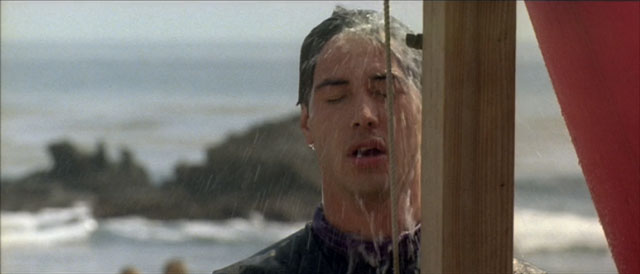

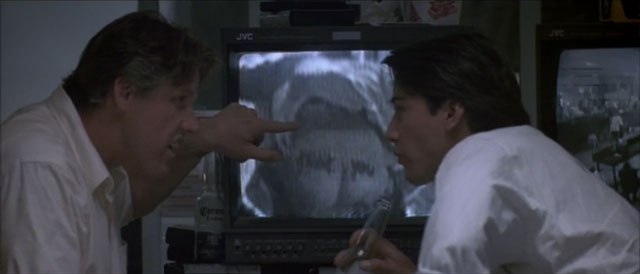
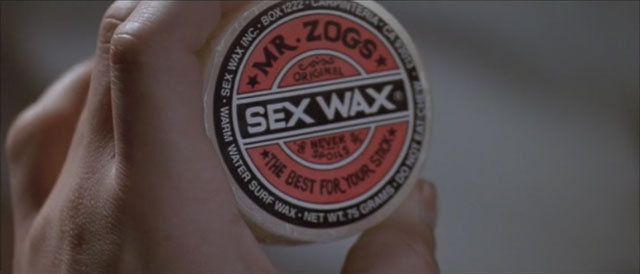



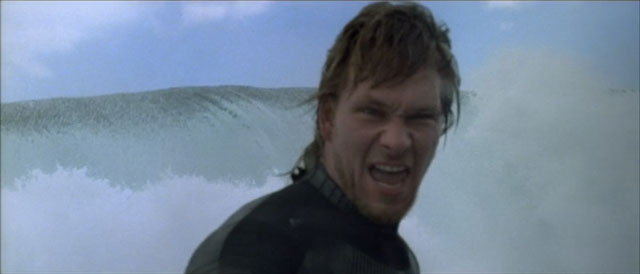
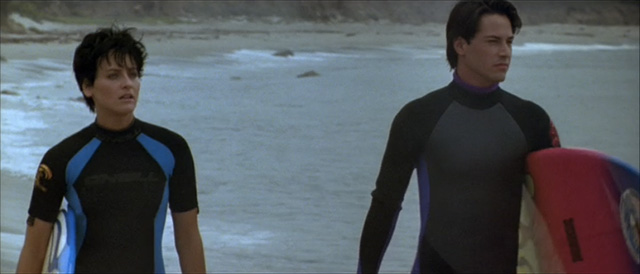
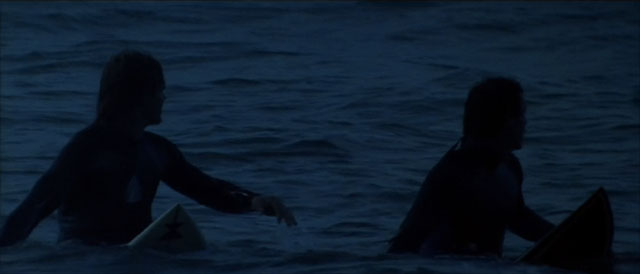
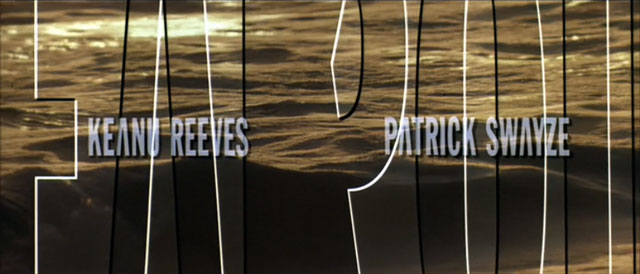
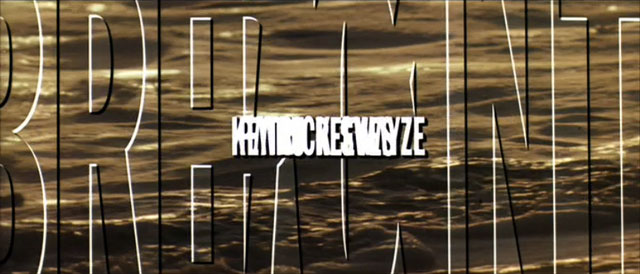


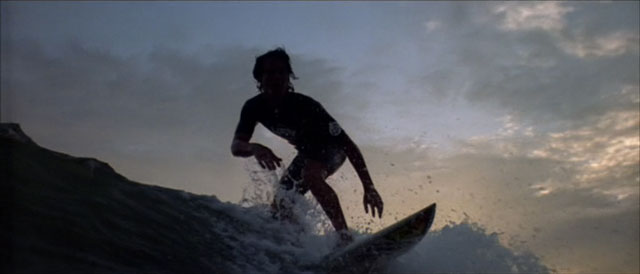
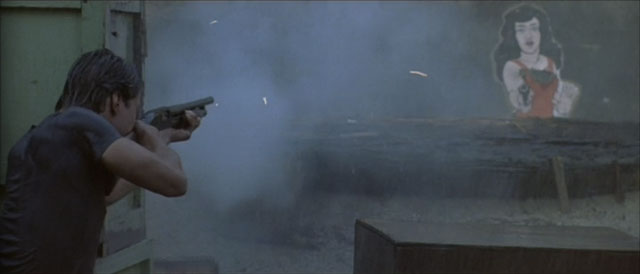
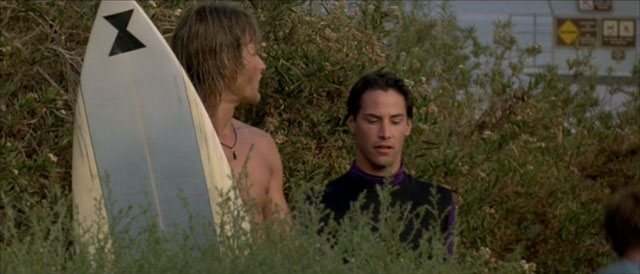
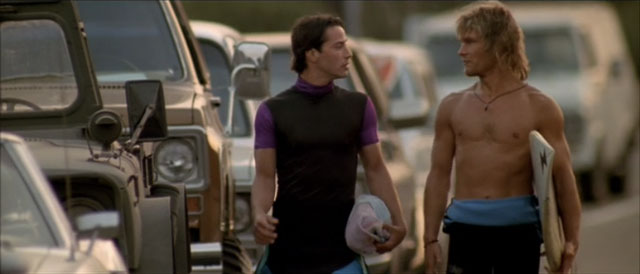
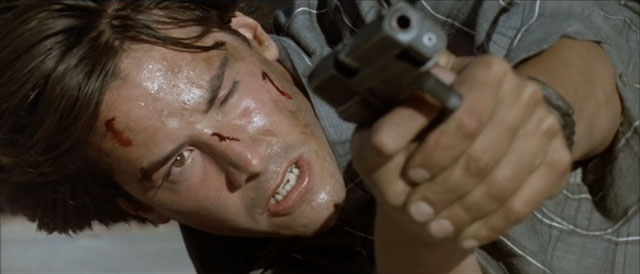
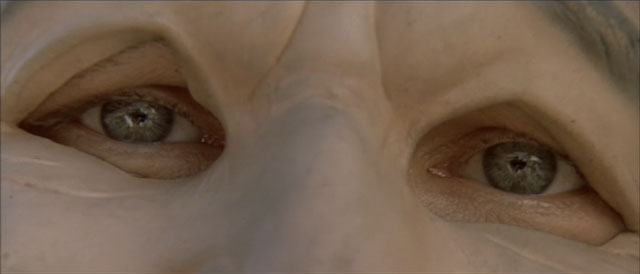

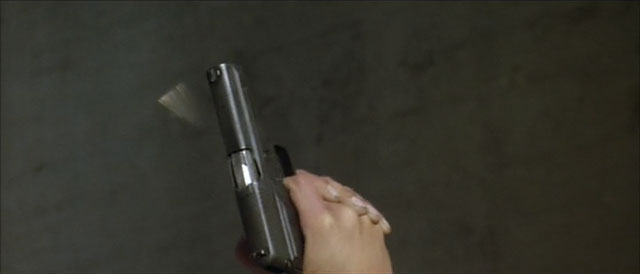




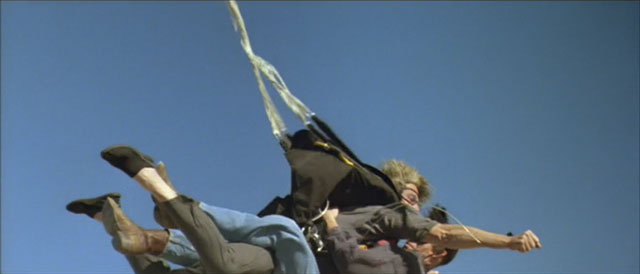


14 Comments
By Tiel Lundy on February 15, 2014 at 9:25 AM
Fantastic work, Anthony! I’m inspired to go back and watch Point Break again–probably tonight. I love the details (imagistic and linguistic) you offer by way of evidence of the film’s homoeroticism. BAM!
By MrWright on July 24, 2014 at 10:02 AM
Reminds me of Quentin Tarantino’s monologue in “Sleep with me”. Of course that was talking about Top Gun, but the idea was the same.
I have to admit the article is well thought out and rather entertaining, but looking for homosexual overtones in manly films is too easy.
Next thing you’re going to tell me is The Fast and the Furious was a love story between O’Conner and Toretto? Toretto being a masculine man surrounded by other dudes and a woman who is somewhat masculine. In the end O’Conner set his love free, and he came back in movie #4.
By Jb on March 2, 2015 at 10:58 PM
While your theory is plausible, most of it probably true; some of your examples are a bit outlandish. The last skydiving scene was not a representation of homosexuality. Simply a fed trying to capture a criminal. Surfboards are not made of wood. Utah’s inability to kill Bohdi after the chase was because Utah didn’t feel Bohdi’s crimes warranted him dying. It took the deaths of the undercover cop at the bank, Papas, and some of the ex-presidents for Utah to finally believe Bohdi deserved to go down. Utah was prepared to shoot Bohdi in the last plane jump scene, and he let Bohdi go at the end because he knew Bohdi would die. There were some homoerotic undertones, but I believe Utah was attracted to Bohdi’s lifestyle than actually Bohdi himself. We learn in the end Utah has surfer hair and still continues to surf and gives up being an FBI agent because he knows that’s not who he is.
By MCP on January 15, 2017 at 5:32 AM
@JB, Utah could have easily paralyzed Bohdi by shooting him in the leg or thigh without killing him, but he chose to let him go completely. How do you justify Bodhi looking back at him to make sure he was okay?
By Gracie on January 1, 2018 at 2:18 PM
Fascinating read! (I’m a bit late to the Point Break party…) I’d be very interested to read your thoughts on Bodhi vs. Utah revisited in the Point Break remake. Let me know if there’s a link to it!
By Mike Dillinger on April 17, 2018 at 11:48 PM
I wann know if Utah stayed with Tyler?
By Ann on August 10, 2018 at 5:44 PM
I’m quite late here, but found this interesting. Have you ever seen Black Widow? There is a very similar thing in that movie where the men are mostly props to an obsession/love story/cat and mouse between Debra Winger’s character and the villain.
By Bree on May 7, 2019 at 6:24 PM
I know it’s been years since this piece was posted but I hope you know that I read this post like once every few months and always use it so I can convince my friends to watch it with me. It’s so so good and sums up exactly how I feel about the movie.
By Anthony on May 13, 2019 at 8:00 PM
Thank you, Bree! That means a lot. I’m terrible about checking comments here and clearly I’m several years late responding to most of them. I really appreciate the feedback :)
@ann I have not seen BLACK WIDOW but I will check it out, thanks for the suggestion.
@mike no way! Utah is too heartbroken to ever love again.
@gracie Thanks! I was really disappointed by the POINT BREAK remake. I had high(ish) hopes because I think Edgar Ramirez is terrific actor and a great choice to play Bodhi. Unfortunately it felt like watching a 2hr Mountain Dew commercial.
By Winona Layne on August 31, 2019 at 5:23 AM
This cracks me up.
By tomley on October 6, 2019 at 7:06 AM
Not to rain on the parade here (I’m not referring to ejaculate), but this review was imo clearly written by someone with a “gay lens” and bias.
While I do think there is some what feels like homoerotic expression in this movie, I think it mostly comes from a sort of spiritual love and admiration between the two main characters (men) and the conflict arises not because of penises or sexuality, at least intended in the movie, but because of both men being on opposite sides of the law. Any other conflict is the viewers. Bodhi at heart is a good free spirited guy who doesn’t care for violence or wealth yet he commits bold criminal acts. He does it for the thrill and irony, not because he wants to bang a guys ass. Bodhi strikes me as the kind of person that if he wanted to do that, to bang a guy, he would do it with zeal. And maybe he has already. Maybe he is bisexual since he obviously likes women as does Johnny. Maybe he tried it already and did not care for it. Who knows.
I think they do admire each other.. Johnny admires and is attracted to Bodhi for his contradictions (conflict) and the education he provides (in addition to needing to give attention to him since he is leader of bank robbers) and lets face it we ALL admire Bodhi with his philosophical energy and charismatic way.. he is Manson lite without the evil.. Bodhi is a very likable guy…everybody loves bodhi.. bodhi admires Johnny for his brave nature/fearlessness and willingness to go along. Plus he is a respected football guy. I don’t think its anything more than that. They have a lot in common except for one is cop one is criminal. A very big conflict.
I’ve read a few places that James Cameron actually had a hand in rewriting a lot of this (uncredited). Not to take any credit away from his ex wife, but, to me, this movie screams James Cameron all over the place more so than some holy female perspective.. from the well paced and shot action scenes and quirky characters to the deeper reflections and tensions, to me it feels like it could be a JC movie.
I think the reason bodhi looks back at him is not because Johnny hurt his knee and he wants to make sure he is ok…we all know at this point he has a bum knee.. he looks at him for the simple reason because the chase has stopped and he is in real danger of being shot since Johnny can no longer pursue yet can shoot him since he has the time and shot. So he faces him. And Johnny cannot do it because he does admire him (and perhaps even agrees with certain elements of his life philosophy) and as someone else mentioned it isn’t warranted. It would be tantamount to shooting him in the back since Bodhi is not firing on him or attacking him. He shoots in the air in frustration not because he is ejaculating bullets in the sky.
In any case, it’s a great movie. Thanks.
By Alex on May 20, 2020 at 9:07 PM
Absolutely flawless analysis by Anthony Manzi of one of the greatest Action/Dramas/Bro-Love movies of all time!
By BC on September 6, 2022 at 5:56 AM
@JB He thinks Bodhi should go down, that’s for sure.
By Dave Lubrano on December 6, 2023 at 11:02 AM
Would they have a part II where Johnny Utah catches Bohdi and they runoff together chasing waves. Bohdi survived Bell’ Beach, Utah leaves the FBI, Bohdi is assumed dead, and they spend their lives surfing together. He obviously breaks up with his girlfriend, Bohdi’s passed-around former squeeze. Maybe the plot is another FBI agent who is chasing after the Utah/Bohdi crime team.
Leave a Comment